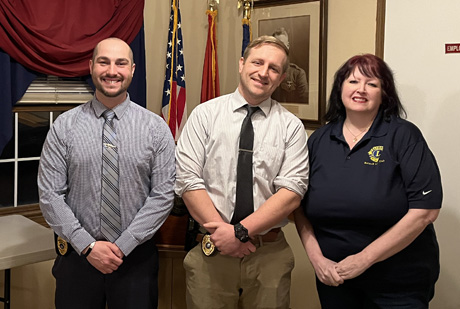Law and Order: BPD announces arrests of suspects with multiple failure to appear warrants
Kyle J. Schroeder, 26, of Clinton Street Road, Batavia, was arrested on four bench warrants issued by Batavia City Court on March 22 by Officer Wesley Rissinger. The bench warrants stem from four separate incidents. Schroeder is accused of entering a residence on April 23 on Liberty Street, Batavia, and stealing a pack of cigarettes. He was arrested on April 24 and issued an appearance ticket. Schroeder was arrested on April 29 and accused of driving while under the influence of drugs and of criminal possession of a controlled substance 7th. He was arraigned in City Court and released. Schroeder was arrested on Aug. 25 after patrols were dispatched to the rear of a business on East Main Street to check a report of a man "tweaking out." After being identified, Schroeder was arrested on bench warrants for alleged failure to appear. He was also charged with criminal possession of a controlled substance 7th after allegedly being found in possession of crack pipes and baggies. He was arraigned in City Court and released. Schroeder was arrested on Oct. 20 on a charge of criminal mischief while at court on another matter. Schroeder allegedly kicked and damaged an electrical lock box on the exterior of a business on Jackson Street so he could charge a mobile phone. He was arraigned and released under supervision. On Jan. 28, Schroeder was arrested on multiple warrants related to the previous arrests. Following his arrest on March 22, Schroeder was arraigned in Centralized Arraignment Court. His release status is unknown.
Christine M. Caplis, 42, of Clinton Street Roa, Batavia, is accused of failure to appear and was arrested on a bench warrant on March 23 by Officer Sam Freeman. Caplis was arrested after Freeman spotted her walking on Summit Street in Batavia. She is accused of failure to pay for services at a local restaurant on Nov. 5., 2021. She was arrested on six subsequent bench warrants related to the original charge. Arrest dates: Dec. 28, 2021, June 26, 2022, Aug. 13, 2022, Sept. 18, 2022, Oct. 7, 2022, and Feb. 18, 2023. Following her arrest on March 23, Caplis was arraigned in Centralized Arraignment Court, and her release status is unknown.
Marquis K. Saddler, 32, of Post Avenue, Rochester, is charged with tampering with evidence, criminal possession of a controlled substance 3rd, criminal possession of a controlled substance 4th, failing to yield to an emergency vehicle and illegal turn signal. Saddler is accused of throwing a narcotic out of the driver's side window during a traffic stop on March 13 at an unspecified time on Naramore Drive. Saddler was arraigned in Centralized Arraignment Court and held in the Genesee County Jail.
Alexander C. Schwartz, 27, of Harwin Drive, Rochester, was arrested on a bench warrant for failing to appear and is charged with bail jumping 3rd. Officer Kevin Defelice arrest Schwartz on March 22. Schwartz was transported from the Niagara County Jail to Batavia City Court, where he was arraigned and remanded to the Genesee County Jail in lieu of bail. Schwartz was first arrested on Nov. 13 and charged with aggravated unlicensed operation 1st and speeding.
Jamie L. Broadbent, 40, of W Main Street, Batavia, was arrested on a bench warrant. Broadbent is accused of failure to appear on a grand larceny 4th charge. She was arrested Sept. 10 for allegedly stealing an electric bicycle. She was issued an appearance ticket and is accused of failing to appear as ordered to answer to the charge. She was arrested on the warrant by Office Megan Crossett on March 21.
James A. Reinhardt, 54, of South Lake Road, Corfu, is charged with aggravated DWI, failure to keep right, moving from lane unsafely, and failing to use designated lane. Reinhardt was stopped at 2:22 a.m. on March 18 on West Main Street, Batavia, by Officer John Gombos. Reinhardt was issued an appearance ticket.
Joanne M. Robbins-Lockwood, 55, of Bank Street, Batavia, is charged with DWI and operating with no headlights. Robbins-Lockwood was stopped at 9:20 p.m. on March 17 on Ross Street, Batavia, by Officer John Gombos. She was issued an appearance ticket and released.
Johnney L. Shannon, 64, of Creek Road, Batavia, is charged with criminal possession of a controlled 7th. Shannon was stopped on Washington Avenue on March 19 by Officer John Gombos. Gombos requested the assistance of Officer Stephen Quider and K-9 Batu. Shannon was allegedly found in possession of several bags of narcotics inside the vehicle. Also arrested and charged with criminal possession of a controlled 7th was Loretta L. Baer, 51, of Wood Street, Batavia. Both were released on appearance tickets.
Haley M. Larnder, 23, of River Street, Batavia, is charged with criminal possession of a controlled 7th. While arresting Larnder on a bench warrant, Officer Wesley Rissinger allegedly found Larnder in possession of a narcotic. Larnder was issued an appearance ticket and turned over to the Sheriff's Office on the warrant.
Michael S. Veihdeffer, 50, of South Royal Parkway, Lockport, is charged with DWI and equipment violations. Veihdeffer was stopped at 1:45 a.m. on March 19 on West Main Street Road by Officer Joseph Weglarski. He was issued an appearance ticket and released to a third party.
Curtis Middlebrooks, Jr., 33, of Bloomingdale Road, Alabama, is charged with harassment 2nd. Middlebrooks was arrested by Deputy Jonathan Dimming in connection with an incident reported at 6:55 p.m., March 18, on Bloomingdale Road, Alabama. No information was released on the nature of the incident. He was arraigned in Centralized Arraignment Court and released on his own recognizance.
Brian Carl Valyear, 18, of Alexander Road, Alexander, is charged with DWI and driving with a BAC of .08 or greater. Valyear was arrested at 12:27 a.m., March 18, on Alexander Road, by Deputy Trevor Sherwood after Sherwood was dispatched to investigate a report of a vehicle blocking the roadway. Valyear was released on an appearance ticket.
Jason Howard Freeman, 41, of South Spruce Street, Batavia, is charged with criminal possession of a controlled substance 7th. Freeman is accused of possessing narcotics when he was taken into custody on an unrelated charge on Nov. 2 on West Main Street, Batavia. He was issued an appearance ticket.
Weldon Jarreau Ervin, 31, is charged with assault 34d and unauthorized use of a motor vehicle. Ervin is accused of recklessly causing an injury to another person during a disturbance reported at 8:30 a.m., March 26, at a location on Alleghany Road, Pembroke. He also allegedly took the vehicle of another person without permission. He was ordered to appear at a later date in Town of Pembroke Court.
Jason S. Hall, 33, of Medina, and Terry L. Depoty, 34, of Albion, are both charged with grand larceny 4th and criminal possession of stolen property 4th. Hall and Depoty were arrested by State Police in connection with an incident reported in the Town of Batavia at 11:20 a.m., March 29. Hall was released on an appearance ticket and Depoty was ordered held in jail. The State Police did not release more information on the arrests.
Michael J. Mess, 30, of Alexander, is charged with grand larceny 3rd and insurance fraud. Mess was arrested by State Police in connection with an incident reported at 9:30 a.m. on March 15. He was released on his own recognizance. The State Police did not release any further information.

































